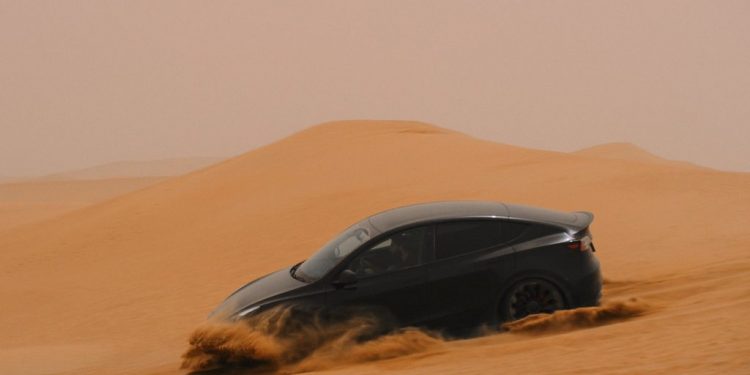Tesla headed to Dubai recently to test its cars in the ‘extreme heat’.
The American multinational automotive and clean energy company took to social media to share stunning images of their vehicles bashing dunes and navigating rugged terrains.
The line-up of cars tested in Dubai includes Model Y, the refreshed Model X and Model 3 vehicles, with the latter recently fitted out with new LFP cells. The engineers possibly also monitored the performance of the new heat pump, introduced in the Model Y last year, which didn’t do as well as expected in frigid climes.
Based on the images posted on Tesla’s Instagram account, the engineers took on the sand, mountain roads and gravel-strewn tracks during the testing, the results of which have not yet been announced.
Testing a car for durability requires it to be pushed to the hilt — be it in extreme temperatures, on treacherous terrain or flung across the bends of a racetrack — to gauge handling ability and suggest potential improvements.
Tesla recently introduced a barrage of upgrades to its models, factoring in parameters such as ambient temperature, humidity, tyre pressure, crosswind and even phone charging — all of which were presumably tested in the deserts of Dubai.
The Twitter debacle aside, Tesla founder Elon Musk also made news this month when he announced he was raising the price of Tesla’s Full Self-Driving (FSD) software in North America, from $12,000 to $15,000, from September 5 after the release of version FSD Beta 10.69.2 for the company’s driver assistance system.




![The Top & Most Popular Seafood Bucket Restaurants in Dubai for you [Never Miss]](https://uae24x7.com/wp-content/uploads/2020/09/8-seafood-in-a-bucket-scaled-e1600739237403.jpg)
![Procedures for Renewing the Driving License in Abu Dhabi [3 Simple Steps]](https://uae24x7.com/wp-content/uploads/2020/07/Capture-9-e1595666454466.jpg)





